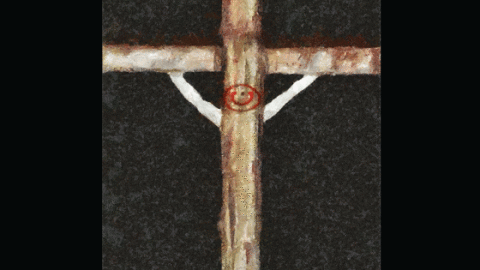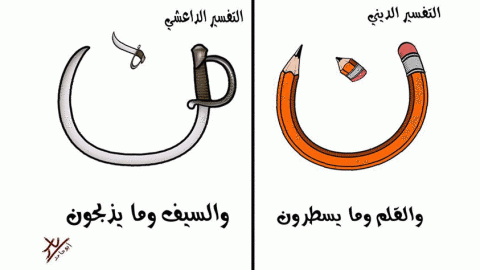As the Islamic State of Iraq and Syria (ISIS) pursues its expansionist plans in the Levant, popular reaction to the extremist group steadily grows as well. In Syria, whether in the form of demonstrations, or through offline and online campaigns, civil society has repeatedly expressed its rejection of the ISIS agenda. (See previous SyriaUntold articles on this issue)
“What happens to them happens to us” was the motto of one of the latest campaigns, launched in solidarity with the indigenous Christians population, who have suffered indiscriminate attacks by ISIS. In Mosul, Iraq, this included marking their doors with a spray-painted ن (the Arabic letter for “N”), in reference to the term Nazarenes, used in the region to refer to Christians. The letter served as an ultimatum for the Christian community to either convert to Islam, pay a religious levy, or face death by the sword.
In reaction to these branding practices which evoke the horrible past of Nazism, many Syrians joined social media users from all over the world in changing their profile pictures to the letter “Nun”.
Renowned writer Yassin al-Haj Saleh wrote on his facebook page: “I am Christian”. His initiative was replicated by many, including graphic designers and graffiti artists.

“Jesus Christ was born in this region, and he was crucified here”, artist Wisam al-Jazairy said in an interview with SyriaUntold. “Who are these people to tell Jesus to leave his own home?”. Al-Jazairy is the author of a painting that depicts the cross of Jesus with a letter ن in the middle, under the title “A Christian from Mosul”.
Syrian-Palestinian artist Yasser Abu Hamed devoted one of his latest paintings to mock ISIS’ interpretation of religion, based on the rule of the sword, as opposed to the enlightenment promoted by Islam.
In Syria, as in the rest of the region, the letter ن has shifted from a symbol of discrimination into a symbol of resistance to discrimination. Attempts by sectarian agendas to impose a discourse of hatred clash with heavy reactions from citizens willing to stand in defense of diversity.




